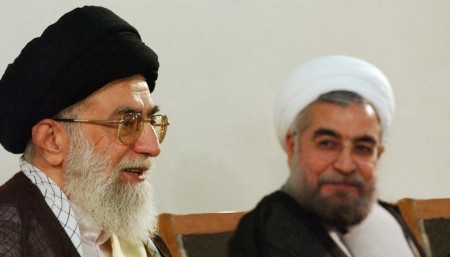Throughout this week, some of the Western media have been distracted from the nuclear issue by tangential sideshows. As Christopher Dickey of the Daily Beast summarised:
[Presidents Obama and Rouhani] were both supposed to attend the same luncheon and perhaps do something world-shaking after more than 30 years of Iranian-American hostility like, for instance, shaking hands. But they didn’t. Rouhani was a no-show.
After that, Tehran and Washington buzzed with rumors that Iranian Supreme Leader Ali Khamenei had jerked Rouhani’s chain.
In fact, the front-line comment in Iran has not been “buzz” about the lunch or even Rouhani’s tightrope-walk — between Tehran’s hard-liners and US opinion — over the Holocaust.
Instead, if you look closely at the Iranian media — as Iran Tracker has — you can see the pattern following President Rouhani’s address to the United Nations on Tuesday and the encounter behind Foreign Minister Mohammad Javad Zarif and US Secretary of State John Kerry on Thursday.
The Islamic Republic, including its hard-liners, are serious about the possibilities of high-level discussions on Tehran’s nuclear program.
Unsurprisingly, the Foreign Ministry is supporting Zarif’s initiative. Deputy Foreign Minister Hossein Amir Abdollahian welcomed not only Rouhani’s UN speech but that of President Obama: “The determining factor will be the practical steps that the United States of Americatakes regarding Iran.”
But the cheering is also coming from MPs, such as National Security Commission member and former Revolutionary Guards commander Safar Naeimi Zar. He said he was hopeful that the US and Iran can establish relations within “a framework of Iranian national interest …if they can control their excited political behaviors”.
And when Naeimi Zar cautioned that “radical groups…whose interests can be threatened” would challenge this progress, he was referring to groups in both the US and Iran.
Grand Ayatollah Nasser Makarem Shirazi, a far from reformist figure, assessed, “From the speeches given at the UN, it seems that the Westerners have shown a green light; we are not hopeless and hope a change emerges in the situation.”
Then there are the “hard-liners”. Far from dismissing the contacts with the US and future high-level talks, they are accepting them — making sure that the context is not one of Iranian concessions but of a US recognition of Tehran’s strength.
That view came straight from the Supreme Leader’s office, via his chief military advisor, Yahya Rahim Safavi:
It seems that the Americans have accepted the truth that Iran is a strong and stable country in the region that obeys logical and intelligent methods in confronting its enemies.
For the first time, Mr. Obama announced as America’s President that ‘we do not want regime change in Iran and respect the Iranian people’s rights to access peaceful nuclear energy’ and this matter proved Iran’s right.
The head of judiciary, Sadegh Larijani, took the same line:
Events of the past few days demonstrate the adherence of the Islamic Iran system and nation to its demands and the Westerners’ retreat, because the Iranian nation’s goals have not changed….
We hope that with reasonable behavior of Western countries, the obstacles facing negotiations will be removed.
The head of Iran’s police, Esmail Ahmadi Moghaddam, even worked in a reference to the hand-shaking chatter on Thursday:
America, whose president does not consider any other countries’ heads of state as his equal, is trying very hard to establish the groundwork to shake Mr. Rouhani’s hand. Iran was the start of the General Assembly, and today America needs our negotiations. This matter is no small greatness and demonstrates Iran’s position of power.
And you know that Iran must be serious when the head of the elite Quds Force, Qassem Suleimani — who has emerged in Western outlets this month as the scariest anti-American figure who might undercut Rouhani — makes a rare headline appearance in Tehran’s media.
Soleimani, speaking in Kerman Province, was harsher than others in his language about Washington. He said to President Obama:
Your statement that ‘we are not seeking the Islamic Republic system’s overthrow’ is not a statement of kindness, but rather an announcement of incapability. You have been, and will remain unable to be, successful in overthrowing the Republic’s system.
In the past thirty-five years, America has conducted the most dishonorable and worst measures against the Islamic Republic system, and this record will remain in the nation’s memory….You even set restrictions for medicine purchases by the Iranian nation.
Still, the context of Soleimani’s remarks was an acceptance that talks should proceed, albeit with a firm Iranian line over the nuclear programme.
There should be no illusions here. The Iranian elite — including the Supreme Leader — are supporting President Rouhani’s “engagement” only because they see a possibility that the US might finally accept Iran’s right to enrich uranium and lift sanctions. Any demands by Washington at unilateral Iranian concessions — for example, limiting enrichment to 5% uranium and shutting its plant at Fordoo — and a refusal to ease sanctions significantly will kill discussions almost as soon as they start.
But, for now, the Islamic Republic’s establishment is ready to put this to the test. As
Speaker of Parliament Ali Larijani said about Rouhani’s initiative at the UN:
Through its honest relations, rational approach, and responsibility, Iran showed that it is looking for accountability and the creation of security and psychological peace.
In the past, [Americans] looked to overthrow the regime but were unsuccessful; however, they must say why they have taken their foot out of this valley, unless the Iranian people have some sin other than exiling a dictator….We must witness changes in their actions.

